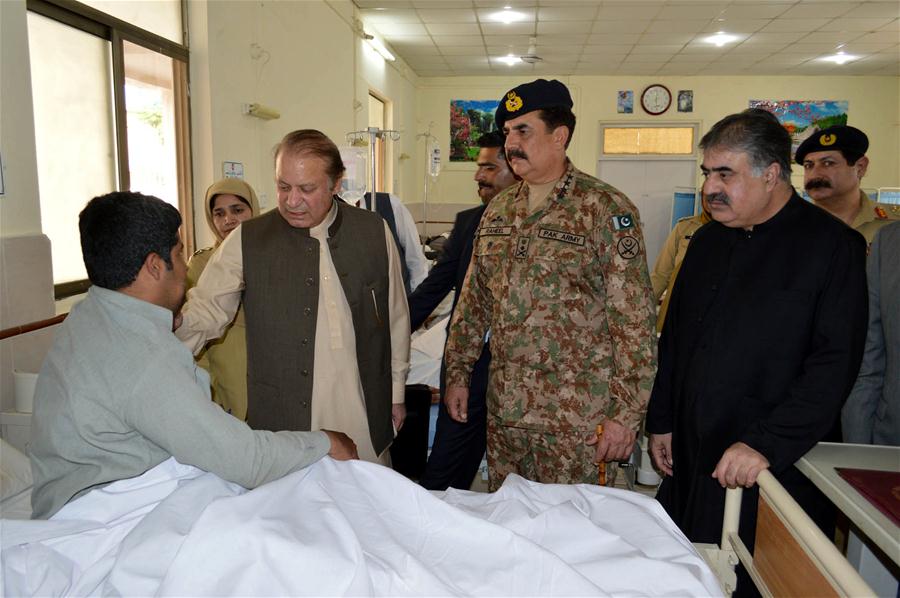
Pakistani Prime Minister Nawaz Sharif (L,center) and Pakistan's army Chief Raheel Sharif (R,center) visit a man who was injured in the hospital bomb blast at an army hospital in southwest Pakistan's Quetta, on Aug. 8, 2016. At least 70 people were killed and 112 others injured in a suicide blast inside the emergency ward of Civil Hospital in Pakistan's southwestern Quetta city on Monday, hospital sources said. (Xinhua/Asad)
by Muhammad Tahir
ISLAMABAD, Aug. 8 (Xinhua) -- Terrorists massacred civilians in Pakistan's southwestern Balochistan province on Monday in an apparent sheer frustration after many of them have either been killed or expelled from their bases in the country's lawless tribal regions as the result of military operations.
Officials confirmed that majority of those killed in the attack outside one of the main hospitals in Quetta, the provincial capital, were civilians, including lawyers, who gathered to protest against the killing of their local president, Bilal Anwar Kasi.
Kasi was shot dead in a separate terrorist attack minutes before the bombers hit the gathering of the lawyers.
Tehrik-e-Taliban Pakistan Jamaat-ul-Ahrar group claimed responsibility for the suicide bombing in Quetta that killed nearly 70 people and injured around 100, the group spokesman, Ehsanullah Ehsan said in a statement.
Lawmakers are calling for better coordination among all security agencies and the unity of political forces to defeat the terrorists.
Ghalib Khan, a member of the National Assembly from South Waziristan tribal region, says all political parties and segment of the society should set aside their differences to defeat those who are attacking people in hospital.
"The government of Prime Minister Nawaz Sharif has done a lot to deal with the terrorism and violent extremism. Now we all should forge unity to counter the remaining threat," the lawmaker told Xinhua in Islamabad late on Monday.
Although the militant groups have been deprived of their sanctuaries in their former strongholds and the security situation across the country has substantially improved, the terrorist attack in Quetta shows that they still have networks to plan and execute attacks in public places and to find soft targets.
Like others, members of the TTP Jamaat-ul-Ahrar were also previously working from the North Waziristan tribal region but security officials say all the militants currently "operate from the Afghan side of the border."
The terrorist attack in Quetta has highlighted the vulnerability of the different communities including who the terrorist mindset also considers as their genuine target because of their profession.
The Taliban and other militants have their own interpretation to consider lawyers as part of what they think as secular system. Majority in Pakistan reject this approach.
Whatever the mentality of the militants might have been, protection of the people is the main responsibility of the state institutions.
This situation emerges as a new major challenge for the government and its security and agencies to improve its intelligence and monitoring system to thwart such plan before they are implemented.
Another lawmaker, Mussarat Ahmed Zeb, says the terrorist acts to target even hospital underlines the need for thorough review of the policies.
"Time is ripe to go after the sleeping cells of the terrorists who have no care for the defenseless people," Zeb told Xinhua on Monday shortly after the massacre in Quetta.
The security forces had conducted some raids on suspected hideouts of the militants in parts of the country who had escaped from the tribal regions.
There is a need to keep on continuing these operations and the focus should be shifted to cities where the militants take advantage to mingle with the local population.
It is a test case for the security agencies how to unearth and go after those who shelter and facilitate the terrorists in urban areas.
There is a need of special attention to the security of Balochistan as the province is important due to its strategic location and abundance in natural resources.
The inimical forces are using terrorists to destabilize the province. This threat requires an effective government response and backing of the entire nation.


